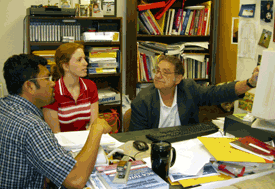CSC News 2
For Tiffany Barnes, computer science is a matter of doing well what she likes best
 That’s what Dr. Tiffany Barnes discovered as she worked her way through high school and later college at North Carolina State University, where she earned her bachelor’s and master’s degrees in math and computer science, and her doctorate in computer science.
That’s what Dr. Tiffany Barnes discovered as she worked her way through high school and later college at North Carolina State University, where she earned her bachelor’s and master’s degrees in math and computer science, and her doctorate in computer science.
Now a postdoctoral researcher, Barnes is continuing her research while helping to share both her knowledge and excitement about the possibilities in computer science, especially for other women.
With Dr. Donald Bitzer, Distinguished University Research Professor at NC State’s Department of Computer Science, she’s engaged in cutting-edge research applying her computer science skills in the field of genetics.
Barnes recently presented a poster at the Biomedical Engineering Research Review held at the University of North Carolina-Chapel Hill, reporting on her work with Lalit Ponnala, an NC State electrical engineering doctoral student, in signal processing and its applications in genetics. This is one aspect of bioinformatics that the Statistical Genetics and Bioinformatics research group, a collaborative effort involving Bitzer and other researchers in various departments at NC State and industry partners, is working on.
Bioinformatics involves analyzing extremely large data sets gathered from genetics research, including DNA sequences and expressions from DNA microassays. In addition to Bitzer, other participating faculty are Dr. Jon Doyle, SAS Institute Professor of Computer Science; Dr. Steffen Heber, assistant professor of computer science; and Dr. Mladen Vouk, professor of computer science.
Asked how she got started on her career path, Barnes says, “I was always good in math. And when I went to the North Carolina School of Science and Math, they required us to take a computer science class, and I was pretty good at that,” she says. In fact, she admits that she annoyed her classmates so much with her proclivity for the subject that she ended up in an independent study.
“My Mom said that if you’re going to do something, do it well,” she says. “I did my best in all my classes, but I liked math the best.” The reason, she says, stems from the sense of accomplishment she felt with each problem solved.
“You always know when you’re done with a problem (in math) because you can check your work, and know if it's correct. I liked being able to turn it in and know what the grade would be.” She found out later that the world of mathematics wasn’t quite so cut-and-dried, but that’s what has contributed to her continued interest.
Barnes now teaches a course in applied discrete math (CSC 224), which she describes in contrast to the calculus that students learn in high school: “Calculus is the study of continuous things. Discrete math studies non-continuous objects, things that you can count. It’s the math you need to do computer science.” She teaches an oncampus session with Bitzer, and an online version through the College of Engineering’s distance education program.
In that class, she’s using what she learned during her doctoral research, in which she was developing statistical methods to make online tutorials adaptive for the learner, enabling them to automatically adjust to the learner.
In addition to teaching and her work with the bioinformatics group, Barnes is conducting an ongoing project with Vouk, aimed at encouraging more young women to continue their studies in math and technical fields.
The core of that project, initially funded by the National Science Foundation, is the Girls on Track summer camp. Designed for girls in grades seven to nine, it is offered in the last two weeks of June at Meredith College.
Barnes and Vouk are collecting data about the camp participants, tracking the choices they make in their courses of study and, ultimately, their careers. They’ve collected data for four years now, and will be following their first group of camp participants as they enter college. One goal of the study is to determine if programs such as Girls on Track help encourage more young women to stay in the math and tech fields.
This summer, Barnes is also assisting with a computer science camp offered through NC State’s College of Engineering – one of several camps offered for high school juniors and seniors interested in technology oriented fields. Together with Mike Etheridge, a computer science teaching assistant, they are developing a camp that will give prospective undergraduates a sense of what computer scientists do and help them understand what they might experience as computer science majors at NC State.
- Photos and story by Anna Rzewnicki -
Return To News Homepage